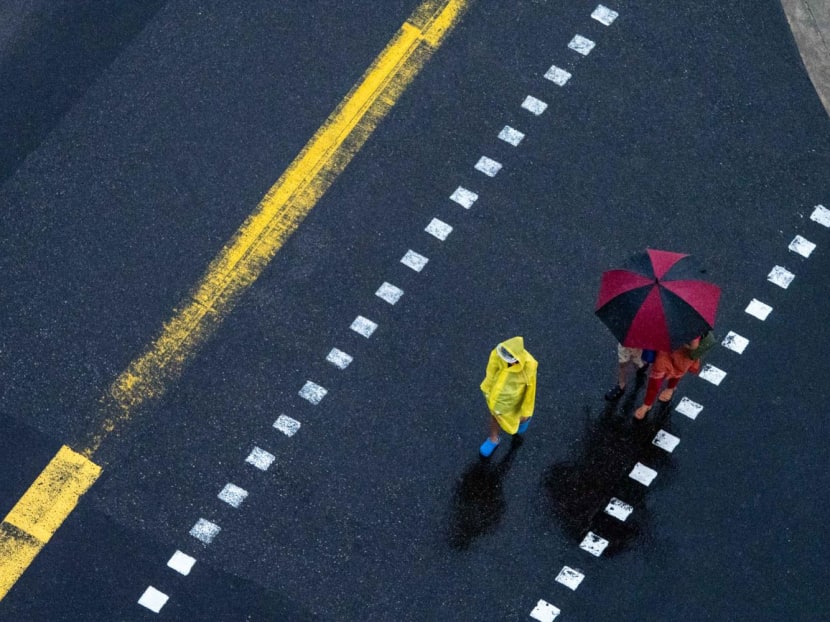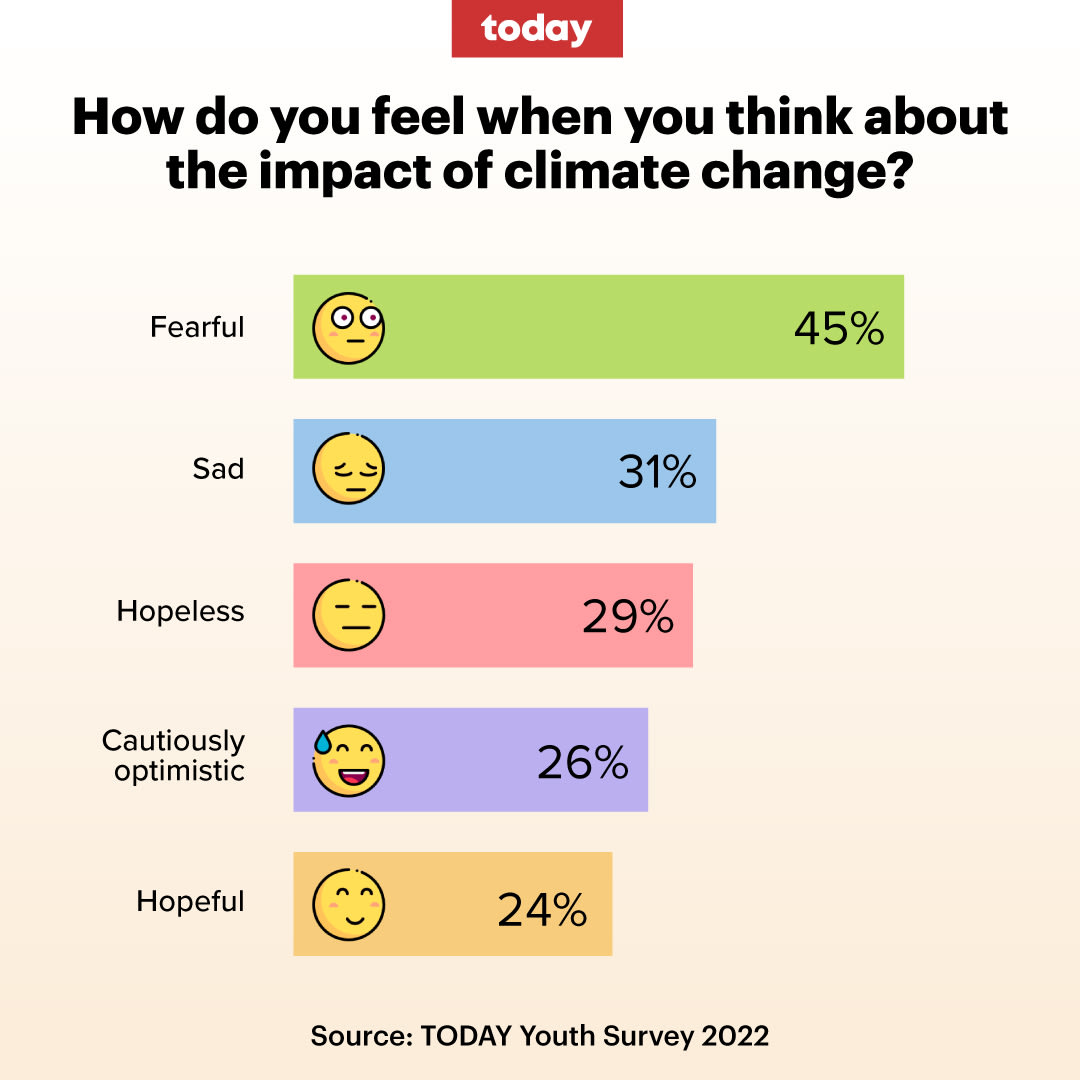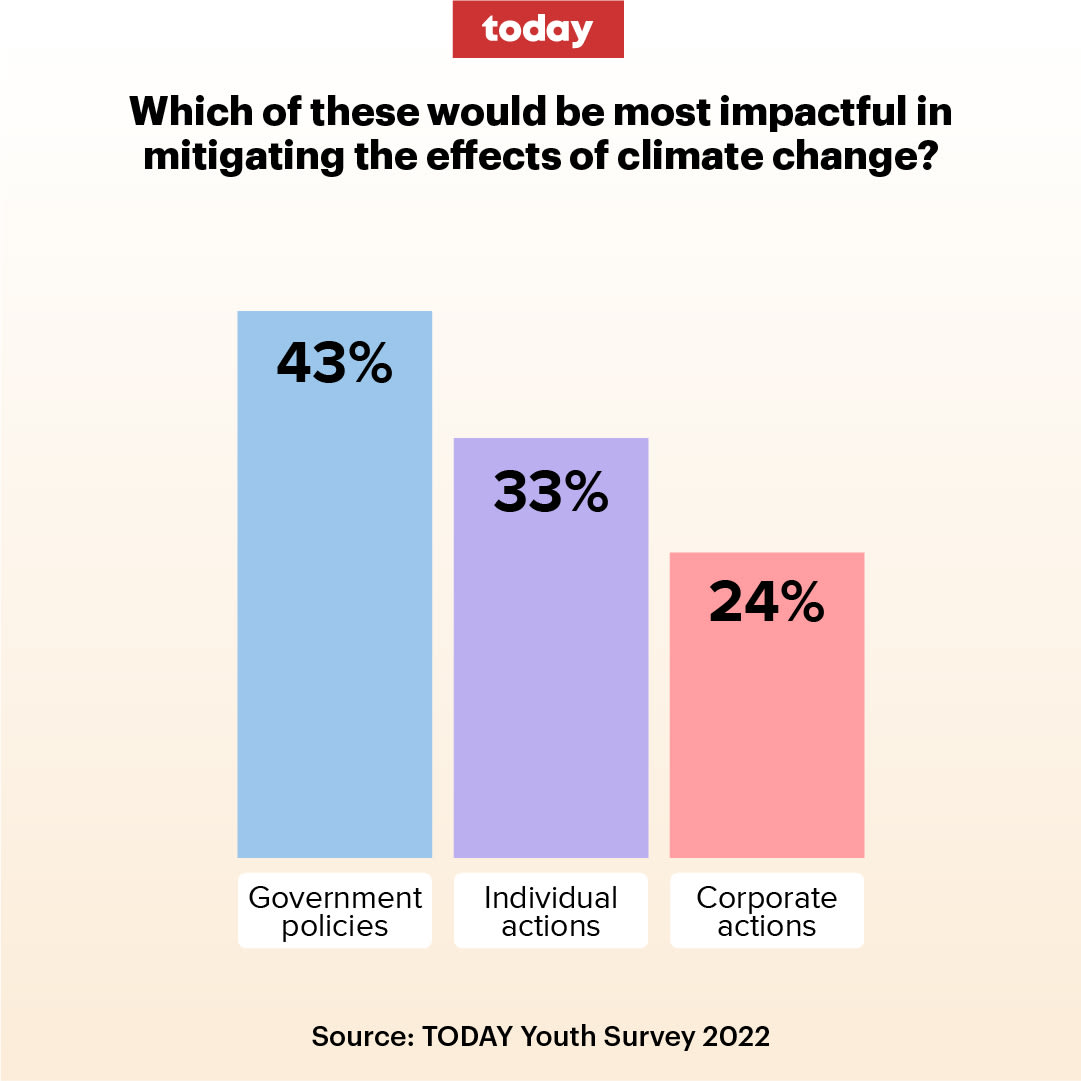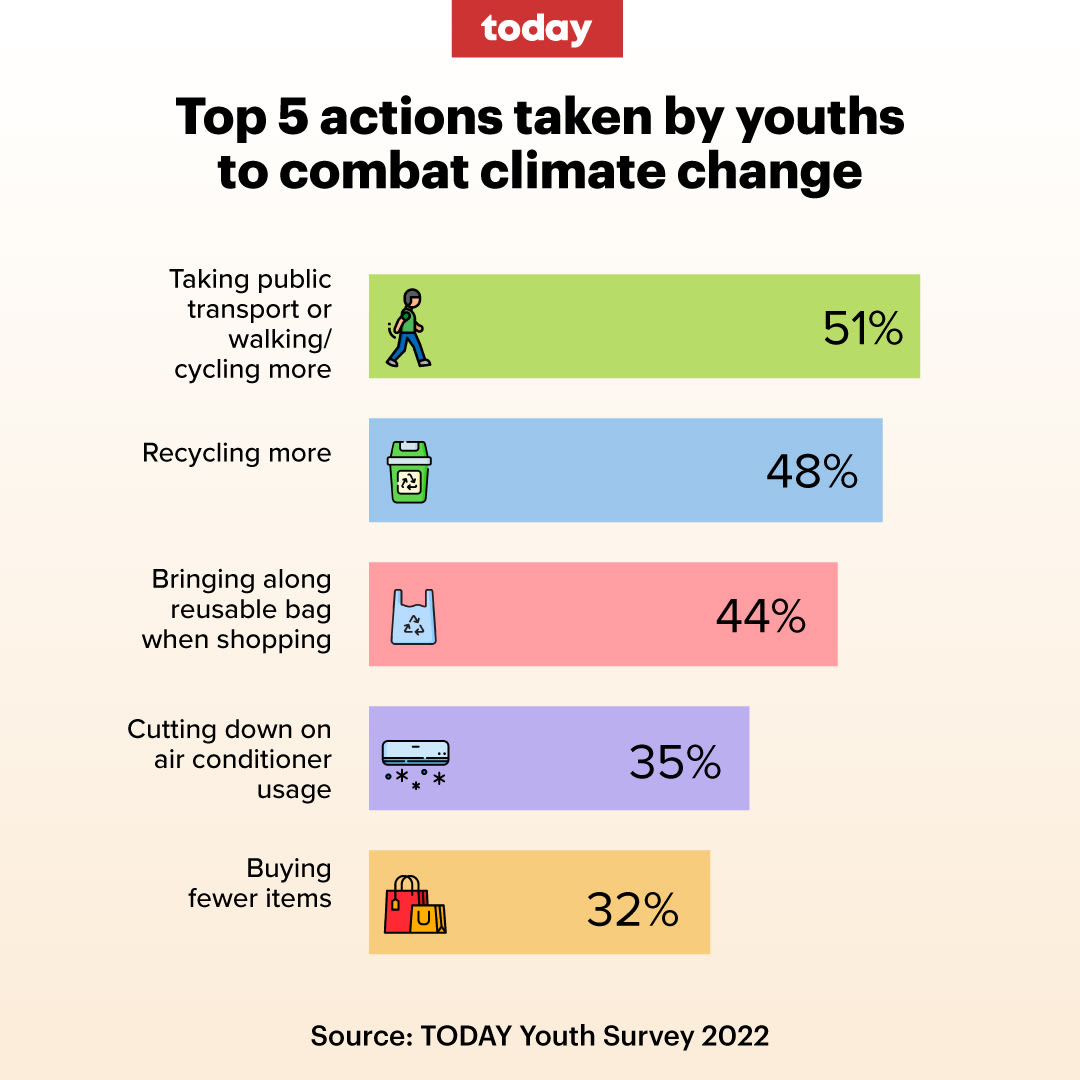TODAY Youth Survey: Climate crisis strikes fear, pessimism but youths believe Govt policies can make the most impact
SINGAPORE — Having been fascinated by animals since she was a child, 25-year-old Woo Qiyun is alarmed at how wildlife species are becoming extinct at rates that have surpassed those in history, and the part that climate change plays in these occurrences.

- A recent survey by TODAY found that young people tend to feel negative about the impact of climate change on their future
- It also found that one in two youth have adopted lifestyle changes to combat climate change
- The respondents felt that government policies were the most impactful in mitigating climate change
- Experts told TODAY that should the young feel motivated to do something about the climate change problem, they can create a “tremendous” positive impact
SINGAPORE — Having been fascinated by animals since she was a child, 25-year-old Woo Qiyun is alarmed at how wildlife species are becoming extinct at rates that have surpassed those in history, and the part that climate change plays in these occurrences.
“(It) is very sad to me… knowing that even if we do something about it, there are things lost that we will never get back,” she said.
Still, Ms Woo, who is a sustainability consultant, said that she wants to remain cautiously optimistic, believing that there is still time to make decisions that will change this trajectory.
For Ms Aishwarya Iyer, a 20-year-old student who is a permanent resident here, climate change has been hitting too close to home, wreaking havoc in the form of more frequent and intense natural disasters in places she has ties to.
Unprecedented floods ravaged her friend’s hometown in Pakistan this year and she feared for her family in Chennai, India — a city by the coast.
“It’s harder to have a positive outlook on how climate change will affect you when it’s already affecting… people from where I'm from and where my friends are from,” she said, adding that social media and the news media generally paint “a very bleak picture of the future”, which does not help to stem her anxiety and worry.
While the climate crisis evokes a range of feelings among the young in Singapore, the TODAY Youth Survey 2022 found that the top three feelings mentioned by respondents when thinking about climate change were negative — 45 per cent were fearful, 31 per cent were sad and 29 per cent were hopeless.
The online survey, conducted in September, polled 1,000 Singaporeans and permanent residents aged 18 to 35.
This is the second edition of the survey. Last year's inaugural survey covered the topics of racism, religion, LGBTQ (lesbian, gay, bisexual, transgender and queer) attitudes, gender dynamics, the impact of Covid-19 on mental well-being and social ties, and career and material success.
This year's survey looked at mental health, inflation and cost of living, climate change and sustainability, as well as work-life balance, politics and attitudes on LGBTQ issues.

CHANNELING PESSIMISM INTO POSITIVE ACTION
Commenting on the TODAY Youth Survey 2022 findings, Ms Melissa Low, a research fellow with the Centre for Nature-based Climate Solutions at the National University of Singapore, said that the pessimism among young people should not be ignored because it could turn into cynicism if not addressed.
However, Dr Andie Ang, president of the Jane Goodall Institute in Singapore, had a more optimistic view. Feeling negative about climate change may not necessarily be a bad thing, she pointed out, because the climate crisis is a threat to people's existence or survival, thereby motivating people to act on it.
“It is important that we do not become paralysed by this negativity. We can feel negative about it and yet be hopeful at the same time that it is not too late to act,” Dr Ang added.
Agreeing, Associate Professor Koh Tieh Yong, a weather and climate scientist at the Singapore University of Social Sciences (SUSS), said: “Some of the youths will be leaders of our society tomorrow. So if they are moved by the gravity of climate change to champion for sustainable development, the positive impact will be tremendous.”
WHO SHOULD BE RESPONSIBLE?
When asked which of three options would be most impactful in mitigating the effects of climate change, the respondents ranked government policies (43 per cent) the highest, followed by individual action (33 per cent) and finally, corporate actions (24 per cent).
Some of the youth interviewed by TODAY said that seeing more open conversations and accountability from countries that make pledges such as net zero emissions would help them feel more hopeful in this bleak situation.
Ms Aishwarya said: “We need actual accountability in some form, like maybe economic sanctions or something actionable… To me, that would be a sign of real progress.”

Ms Woo, too, said that she would like to see corporations and decision makers put money where their mouth is.
“When corporations say that they are reducing emissions, I want to see numbers that actually reflect that.”
Meanwhile, Mr Darryl Ho, 19, who described climate change as the "crisis of a generation", lamented that individuals are not doing enough.
The third-year psychology studies student from Temasek Polytechnic said: “There are so many things that can be done, but no one’s actually doing it. I have been recycling, I have been using reusables... People say they're sad but then they don't do anything (to help the environment)."
For Miss Dorcas Tang, 22, it is the Government who should be taking on more of the burden in this fight.
Ms Tang, who sees herself as an activist and is known as “earthtodorcas” on Instagram, said: “Government policies… can make sure that corporations are transparent with their sustainability goals and it can also make sure that things like environmental assessments are done properly.”
However, experts told TODAY that there is no right answer to who is best in pushing for changes.
Dr Ang believes all three parties — individuals, corporations and governments — are key to making changes.
Individuals make choices that can influence decisions from the bottom up, while policies and strategic directions can drive systemic changes from top down.
However, Ms Low from the Centre for Nature-based Climate Solutions was of the view that government policies are impactful in mitigating the effects on climate change, since much of corporate and individual behaviour can be shaped by regulations and policies.
Agreeing, Assoc Prof Koh of SUSS said: "There are many aspects of climate action, especially those linked with infrastructure and economy, which require governments to initiate changes and coordinate development.
"But at the end of the day, it is the individual who decides to support the political leadership and the individual who makes choices as consumers of goods and services.
“So I think the core drive for climate action still lies with the people.”
HOW THE YOUNG ARE SUPPORTING FIGHT AGAINST CLIMATE CHANGE
The TODAY Youth Survey showed that young people were trying to walk the talk, with one in two respondents in the survey saying that they were actively taking measures to combat climate change.
About half (51 per cent) of the people surveyed said that they took public transport or walk more, 48 per cent recycled more and 44 per cent used reusable bags when shopping.

Ms Tang the activist is trying to spread awareness and start conversations among the community about the climate crisis.
An artist and storyteller, she creates creative content around climate change, ranging from bite-sized social media posts to posters displayed in exhibitions and wall murals.
Her goal is to “invite the wider community into the climate movement through art and storytelling, in a way that's not just throwing facts and figures at them, but really trying to communicate these issues on a very human level”, she said.
Ms Woo, the sustainability consultant who is also science communicator behind the Instagram account The Weird and Wild, said that she tries to make decisions that align with her values of being environmentally conscious.
However, she admitted that she does sometimes wonder: “Do all this for what?”
“But on the other hand, I see how using my own bottle to get drinks or choosing to eat vegetarian food or introducing my friends to vegetarian food do change their minds about certain things or heighten their sensitivities towards topics that connect their consumption to climate change,” she said.
Ms Aishwarya is another youth who has become more conscious about her lifestyle choices. She does not go for fast fashion due to the large amount of waste it produces.
She used to buy four to five pieces of clothing every month in 2020, but can now go for months without getting a new item because she would either make her own clothes or buy clothes that she knows she will wear again, instead of following fleeting fashion trends.
For her and other youth who are doing what they can to do their bit for the earth, these actions may be small but not meaningless.
As Ms Tang put it: "It shouldn't matter what actually happens in the future — whether we avert this crisis or catastrophe, or not. It's more about, 'Did we try our best and did we do the right thing, given our knowledge of the situation?'"
Hybrid webinars will be held on Nov 14 and 15 to discuss the findings of TODAY Youth Survey 2022. More details here.











